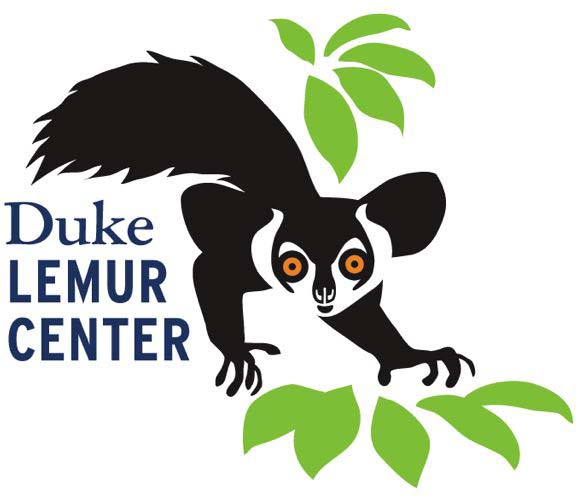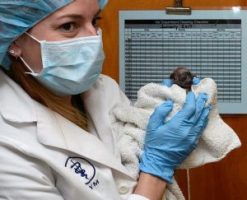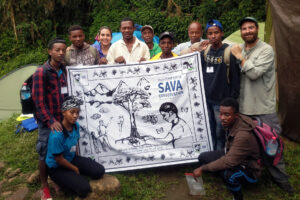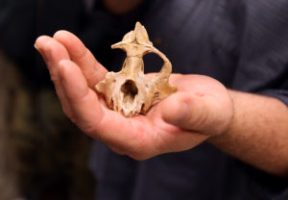Current Priority Needs for Special Gifts: $5,000 – $99,999
While unrestricted donations are always needed, appreciated, and directed toward priority needs of the DLC, these special targeted impact gifts are options for donors who are interested in a larger contribution between $5,000 and $100,000 and wish to restrict their gift toward a special priority need. Some of these opportunities of $15,000 or more can be divided into two or three annual payments to fulfill the total funding needed. Please direct questions to our development officer, Mary Paisley, at mary.paisley@duke.edu.
Funding Opportunities: Student and Volunteer Programs
Support a 2024 summer intern
Your gift of $8,000 or more will support the Lemur Center’s costs to provide a living wage + necessary fringes for one intern. Our internship program offers opportunities during the fall, spring, and summer for students to have hands-on experiences, exploring their interests in field research, animal husbandry, animal welfare, conservation education, or science communication.
Thus far, our approximately 20 students/year from across the U.S. have participated in unpaid internships. The addition of paid internship positions in FY2022 made a great impact on our ability to enlist students who might not otherwise apply or participate.
Funding needed: $8,000 ($32,000 is desired to fund four positions) Update: Two intern positions are funded!
Intern and volunteer transportation cost reimbursement
Make a gift of $5,000 or more toward our expected expenses of more than $20,000 to transport student interns and volunteers to the center and back home during this fiscal year. Transportation is a barrier that could easily prevent a student from participating.
Funding needed: $5,000+ ($20,000 total)
Funding Opportunities: Animal Care
Addition of improved housing for our small nocturnal prosimians
Revised housing for our dwarf lemurs, mouse lemurs, and bush babies is needed to provide them with more varied space, and the ability to house larger family groups together. This adaptive housing is optimal for our nocturnal species, who can’t free range in the forests, like their diurnal counterparts.
Funding needed: $22,000
Kawasaki Mule for animal technicians
These all-terrain vehicles are important for transporting animal technicians, vet technicians, supplies, and lemurs (in crates, of course!) to and from our nine natural habitats and animal care buildings. We replaced one vehicle in 2020, thanks to the Edwards Foundation, but we need to replace another vehicle in 2021.
Funding needed: This $15,000 need was funded by two wonderful donors!
Special animal enrichment supplies
Providing for the mental well-being of every animal is the focus of our enrichment program and is just as important as a proper diet and safe habitat.
Funding needed: $5,000
Animal camera project
New cameras and maintenance of existing cameras allow our staff to check on animals at any time of day or night. For animals like our aye-ayes, who are experiencing their new outdoor enclosures for the first time, these cameras are critical to monitoring their safety and documenting their reaction to a brand-new world.
Funding needed: $16,000
Funding Opportunities: Madagascar Programs – SAVA Conservation
The opportunities below are priority needs that are restricted gift options over $5,000 for this fiscal year. We would like to also recognize the significant contributions to Madagascar Conservation from Darren and Julie Harkness Cooke and Bob and Sue Knox, who are currently funding a number of our specific programs in Madagascar. We’re also fortunate to receive support from General Mills, Inc. We rely entirely on private donations and grants to fund our programs in Madagascar.
Empower a Malagasy scientist to earn advanced degree
Scholarships for Malagasy graduate students to complete their Masters and PhD degrees. The DLC SAVA Conservation Initiative engages undergraduate and graduate students from the regional university in research and conservation. Ten graduates from SAVA are now pursuing advanced degrees with our technical and financial assistance. Your support will fund these students’ tuition, a modest cost-of-living stipend, transportation to and from the other regions, personal laptops and informatics training, and field research focused on lemur ecology and conservation.
Funding needed: $20,000 per student for 3 years to complete their degrees
Sustainable charcoal production with bamboo
Through a new collaboration with the International Organization for Bamboo and Rattan, the DLC-SAVA Conservation program is partnering with farming communities to grow native bamboo species that can be used for diverse purposes, especially as charcoal. Using innovative and accessible techniques, charcoal can be produced from bamboo far more sustainably than current practices which require harvesting hardwood trees, often from protected forests. Support the construction of bamboo nurseries, planting in deforested areas, materials and training in bamboo charcoal production, and implementation in three pilot sites. Your support of this project will provide training, materials, planting, production, monitoring, and evaluation.
Funding needed: This $20,000 project was funded!
Safeguarding the Madagascar National Parks
For 10 years, the DLC-SAVA Conservation project has collaborated with the Madagascar National Parks to support their efforts to safeguard the Marojejy National Park and empower communities to be stewards of the environment. With a new park director and fresh ideas on conserving the park, as well as development for communities around the park, we will initiate the following new projects: public outreach campaigns; durable signage to post in communal areas around parks; and training opportunities to teach park agents and staff.
Funding needed: $25,000
Invest in conservation by local forest management organizations
In addition to the Madagascar National Parks, the protected area network in SAVA includes forests that are managed by local community associations that are responsible for protecting the forest and sustainability projects. Support their efforts with the following actions: provide signage demarcating the limits of the protected areas; construction of a modest forest cabin for long-term monitoring by forest police; essential field equipment like boots, raingear and GPS devices; training in agroecology and domestic animal husbandry; alternative livelihood strategies that include a diversity of locally-appropriate and co-created projects such as village savings and loans associations for financial management, sewing cooperatives to generate income for the associations, and more!
Funding needed: $100,000
Empowering Malagasy graduate students in science sovereignty
Training and empowering Malagasy scientists is fundamental to the sustainability of research and conservation in Madagascar. Malagasy students rarely have funding opportunities to conduct research as graduate students. We have collaborative partnerships with the universities in northern Madagascar, University of Antsiranana (at Diego and SAVA), to support their students conducting independent research projects. We collaborate with university administration to host workshops in research design and analysis; to pair students with faculty mentors; and to lead a competitive research grant program. Students submit research proposals that are reviewed by outside experts, and selected proposals are supported to conduct their field research and a cost-of-living stipend. Through this partnership, dozens of students have strengthened their capacities to conduct research and complete their degrees.
Funding needed: $20,000 total for one year
New Generation School Garden
Focusing on teaching children and adults the value of the environment and new farming practices that reduce environmental impacts, we support an educational program called the New Generation School Garden. Almost 1,000 visitors participate every year from school groups, environmental clubs, and farming associations. Partnering with Founder and SAVA resident Evrard BENASOAVINA, we plan to help improve the garden’s infrastructure while also expanding the demonstration of alternatives to wildlife hunting.
Funding needed: This $9,500 was funded!
Alternatives to wildlife hunting
Hunting wildlife, including lemurs, is a major threat to endangered species in Madagascar. This year, the DLC-SAVA Conservation program is significantly expanding our efforts to teach about alternatives to wildlife hunting. We plan to host specialists to teach residents in the SAVA region how to create and maintain fish ponds, as well as (a new initiative) best practices in poultry husbandry, including hosting veterinarians to teach proper care and disease prevention. These new initiatives will empower Malagasy individuals and families who farm their land to develop their own sustainable alternatives to wildlife hunting while also improving household nutrition. Fulfilled! Thank you to Sharon and Preston Boggess for funding this need!
Funding needed: $13,600
Fuel-efficient stoves project
Support our research and development on fuel-efficient stoves for cooking with charcoal and firewood. Nearly all people in SAVA cook with charcoal or firewood, often on open fires that are not fuel-efficient. We have partnerships with a local NGO to obtain high-quality fuel-efficient stoves that greatly reduce fuel use compared to traditional stoves. We will conduct information campaigns and distribute stoves to 1,000 households and conduct follow-up surveys.
$5,000+ ($30,000 needed)
Educational video series
To expand our public outreach both in Madagascar and the U.S., we are commissioning a Malagasy videographer to produce a series of short videos highlighting the DLC-SAVA projects and how each activity contributes to conservation and development. The videos, produced in Malagasy and English, will be used by our Malagasy staff to disseminate our activities more broadly and on our online platforms to share our progress with the broader community.
Funding needed: $10,000
Project vehicle
As the DLC’s programs in Madagascar diversify and our team grows, so too do our logistical needs. While our first project vehicle, a 2010 Toyota pick-up truck, is still running well thanks to support from our donors, our needs have grown such that we need a second vehicle. Having two vehicles will allow our teams to split up and cover more ground every day, and will reduce inefficient costs associated with renting additional vehicles when our truck is in use.
Funding needed: $50,000
Funding Opportunities: Non-harmful Research
Madagascar Research Initiatives
Research Leadership Exchange
Provide an opportunity for one Malagasy leader in lemur science and conservation to participate in a priority research activity at the DLC, Duke University, and/or the Durham community. Funding will cover an individual’s participation in 1 to 2 weeks and/or 2 to 3 presentations/roundtables offering opportunities for meetings, brainstorming, and/or grant writing; and covers international airfare, hotel, speaker fees, event fees.
Funding needed for one participant: $6,000 Update: This project is funded for 2024!
Endocrine plate reader
This will enable the DLC to do in-house hormonal work in our newly constructed molecular lab, benefiting veterinary care, staff scientists, and visiting researchers by providing more immediate results with less expense than the traditional method of shipping samples off-site for analysis. The cost additionally includes the desktop computer and software necessary to run the plate reader.
Funding needed: $8,000
Transilluminator (gel imaging system)
This piece of equipment is necessary for genomic research conducted at the DLC, specifically for visualization of target DNAs and proteins after electrophoresis. UV transilluminators are used in molecular biology laboratories to view DNA or RNA that has been separated by electrophoresis through an agarose gel. Exposing the stained gel to a UV light source causes the DNA to fluoresce and become visible.
Funding needed: $8,000
Oxygen analyzer and software
For use at the DLC and in Madagascar to measure oxygen and carbon dioxide (better way to assess energetic substrates: e.g., carbohydrate vs. lipids). Estimating metabolic rates in dwarf lemurs will be important as we test hibernation expression under different temperature/diet conditions.
Funding needed: $25,000
Lyophilizer, including accessories
To freeze-dry fecal and plant samples for downstream analyses (hormones, biomarkers, etc.). For in-house use as well as for external researchers, as it would be easier to ship and store dried rather than fresh samples.
Funding needed: $20,000
Ultracold freezer
This freezer is needed for the preservation of invaluable biological samples collected non-invasively during veterinary procedures and made available for scientific research (genomics, immunology, endocrinology, metabolomics, etc.). We need two freezers. The price is for each unit.
Funding needed: $15,000 for one unit or $30,000 for both units
Scientific freezer
Needed for the preservation of cadaveric specimens made available for scientific research (anatomy, biomechanics, ontogeny, etc.). All DLC animals continue to contribute to research, even beyond their natural lifespan. We need two units. The price is the cost for a single unit.
Funding needed: $10,000 for one unit or $20,000 for both units
Funding Opportunities: Museum of Natural History
MicroCT scanning
Our scanning operations are crucial as we race against the elements to create a digital, 3D record of our collection before the North Carolina weather gets the better of it. Traditional paleontology was based on collections visits. Researchers would need to physically visit a collection to examine the specimens. Specimens could also be loaned, but that meant only one person or team could work with a fossil at a time. Researchers also needed to know the collection existed in the first place.
Funding needed: $8,500
Memorial and Dedication Gifts
Our thanks to Jane Harmeling McPherson (Duke University, B.A. ’51 and M.A. ’72) and her family for their friendship and support as the first family to make a special memorial contribution with a permanent plaque recognition at the Duke Lemur Center. The gift was made in memory of Harry T. McPherson, M.D., and David McPherson. We are touched by this very special honor.
5” x 3” plaque on a bench – remains on-premises for the life of the bench
$15,000.
$25,000+ permanent onsite plaque options, contact Mary Paisley at mary.paisley@duke.edu or 919.401.7252 for more information.
Additional Options
If you are interested in finding a special purpose for a gift ranging from $5,000 to $99,000, the Duke Lemur Center is happy to discuss with you our current priority needs and options for your gift to make a significant impact. Please contact our development officer, Mary Paisley, at mary.paisley@duke.edu or 919.401.7252. For information about gifts of $100,000 or more, please visit our Major and Principal Gifts page.





